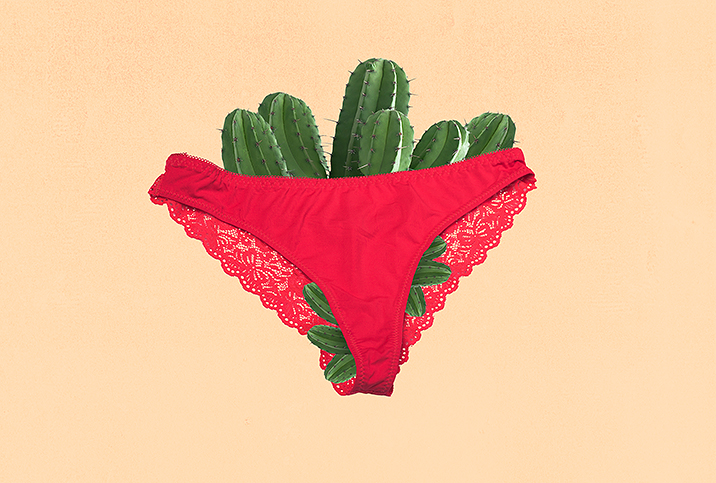Is the Pill Drying You Out Down There?

When working properly, the vagina is always at least a little bit wet, and that's because wetness keeps our genitals clean and provides lubrication to protect us from tears. When we get aroused, the lubrication intensifies, preparing the vagina for penetration. Sometimes, however, the lubrication just doesn't happen. While it may feel embarrassing or wrong, vaginal dryness is common and can be caused by myriad factors.
Most women experience vaginal dryness from time to time, however, if you notice excessive or frequent dryness down there, your birth control pill could be the culprit.
The causes of vaginal dryness
Most vaginal dryness is caused by decreased estrogen levels. Estrogen is a vital hormone that aids vaginal health by helping to maintain a normal pH balance, ensuring tissue elasticity and keeping the vagina lubricated.
You may only notice a lack of lubrication before and during sex, when your body is typically able to self-lubricate. Without proper lubrication, intercourse can be extremely painful and lead to tearing and inflammation. Vaginal dryness can become a pressing issue if it's an all-day experience, causing pain during physical activity and putting you at risk for infection.
Women commonly experience dryness when their estrogen levels fall during menopause, but women much younger may also experience vaginal dryness. Some other common causes include:
- Cigarette smoking
- Childbirth
- Breastfeeding
- Ovary removal surgery
- Anti-estrogen medications
- Hormonal imbalances
- Cancer therapy
- Douching
- Sjögren's syndrome
- Antihistamines
Why the birth control pill may cause vaginal dryness
While the role of hormonal contraception in sexual dysfunction for women is complicated, birth control may play a role in vaginal dryness. If you're on the pill and experiencing prolonged or significant vaginal dryness, you're not the only one.
Birth control containing low amounts of estrogen or drospirenone, desogestrel or norgestimate may be responsible for the lack of vaginal lubrication. Testosterone produced in the ovaries contributes to lubrication, and birth control pills actually decrease your testosterone levels—causing dryness.
Other hormonal birth control pill side effects include loss of libido, nausea, breast tenderness, spotting and more. Nonhormonal birth control methods, such as copper intrauterine devices (IUDs), condoms and cervical caps, have not been found to cause vaginal dryness but can come with their own complications.
Treating vaginal dryness
If you noticed a change in vaginal lubrication after getting on the pill, it's important to talk to your doctor to determine the cause. While it could be the pill, your doctor will consider lifestyle and other physical health reasons. Numerous low-hormone or nonhormonal forms of birth control are available, so switching birth control might be the simplest solution, depending on your medical history.
If you notice vaginal dryness during sex, using a proper lubricant can make sex more comfortable. There is no shame in using a lubricant; in fact, almost 50 million Americans reported using a personal lubricant in 2020. Determining the right lube for you is a personal choice, and a plethora of options are available. Water-based lubricants are recommended if you and your partner use condoms.
If you're looking for longer-lasting treatment and switching birth control is not an option, a vaginal moisturizer may be a good choice. A moisturizer differs from a lubricant in that it can be applied regularly to relieve ongoing discomfort as opposed to just before sex. Various over-the-counter options are available.
Other common remedies include:
- Washing with only water and avoiding soaps and perfumes in the vaginal area
- Taking estrogen or non-estrogen oral therapy
- Inserting estrogen or dehydroepiandrosterone (DHEA) into the vagina
- Applying natural oils such as grape seed, sweet almond, sunflower or coconut
Almost every woman has experienced some form of vaginal dryness. However, if you notice your dryness is lingering or uncomfortable, it may be time to see a doctor. You might need to switch birth control methods or consider a new form of treatment to increase lubrication.


















